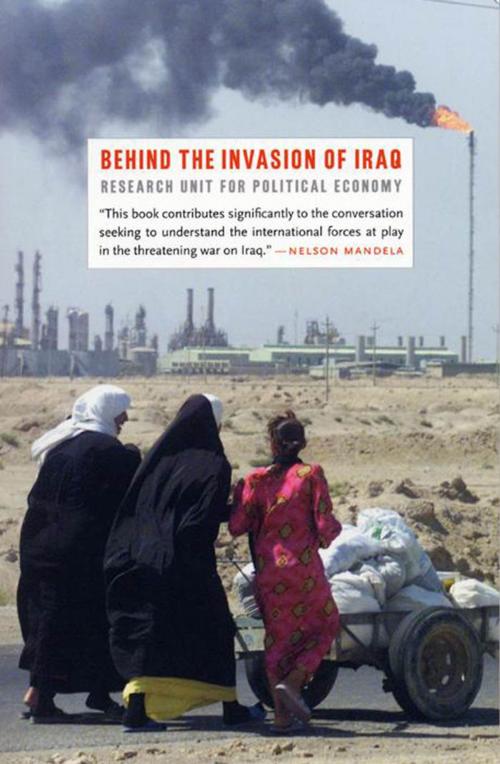| Author: | The Research Unit for Political Economy | ISBN: | 9781583674062 |
| Publisher: | Monthly Review Press | Publication: | September 1, 2003 |
| Imprint: | Monthly Review Press | Language: | English |
| Author: | The Research Unit for Political Economy |
| ISBN: | 9781583674062 |
| Publisher: | Monthly Review Press |
| Publication: | September 1, 2003 |
| Imprint: | Monthly Review Press |
| Language: | English |
"This book contributes significantly ot the conversation seeking to understand the international forces at play in the threatening war on Iraq."
—Nelson Mandela
"Behind the Invasion of Iraq . . .synthesizes the seemingly disparate threads of the U.S. war drive in a blistering indictment of American foreign policy . . .The effect is of puzzle pieces clicking into place."
—Counterpunch
Since September 11, 2001, there have been many accounts of the ways in which the alignment of global power is changing or will be changed by the U.S.'s "war on terrorism." Most of them take as their starting point the options facing the wealthy and powerful nations of the world seeking to control an ever larger share of the world's resources. Behind the Invasion of Iraq is written from a different perspective, and one that makes possible a far more comprehensive point of view.
Its authors, Research Unit for Political Economy, are rooted in the politics of a Third World country—India—which has long been on the receiving end of imperialist power. As a consequence, they have a more sober view of the workings of global power. In clear and accessible prose, weighing the evidence carefully and tracing events to their root causes, they move beyond moral outrage to a clear view of the process being set in motion by the U.S.-led invasion of Iraq. They show that the invasion of Iraq is a desperate gamble by a section of the U.S. ruling elite to preserve their power, driven by the wish to stave off economic crisis through military means. Their efforts will not end with Iraq, but will require the recolonization of the middle East.
Behind the Invasion of Iraq exposes the idea that war will bring democracy to the Middle East as so much propaganda. In a context where so many rulers are themselves clients of the United States, the war is aimed not at the rulers but at the masses of ordinary people whose hostility to imperialism has not been broken even by corrupt and autocratic rulers. This book describes the remaking of global power with a truly global awareness of what is at stake.
"This book contributes significantly ot the conversation seeking to understand the international forces at play in the threatening war on Iraq."
—Nelson Mandela
"Behind the Invasion of Iraq . . .synthesizes the seemingly disparate threads of the U.S. war drive in a blistering indictment of American foreign policy . . .The effect is of puzzle pieces clicking into place."
—Counterpunch
Since September 11, 2001, there have been many accounts of the ways in which the alignment of global power is changing or will be changed by the U.S.'s "war on terrorism." Most of them take as their starting point the options facing the wealthy and powerful nations of the world seeking to control an ever larger share of the world's resources. Behind the Invasion of Iraq is written from a different perspective, and one that makes possible a far more comprehensive point of view.
Its authors, Research Unit for Political Economy, are rooted in the politics of a Third World country—India—which has long been on the receiving end of imperialist power. As a consequence, they have a more sober view of the workings of global power. In clear and accessible prose, weighing the evidence carefully and tracing events to their root causes, they move beyond moral outrage to a clear view of the process being set in motion by the U.S.-led invasion of Iraq. They show that the invasion of Iraq is a desperate gamble by a section of the U.S. ruling elite to preserve their power, driven by the wish to stave off economic crisis through military means. Their efforts will not end with Iraq, but will require the recolonization of the middle East.
Behind the Invasion of Iraq exposes the idea that war will bring democracy to the Middle East as so much propaganda. In a context where so many rulers are themselves clients of the United States, the war is aimed not at the rulers but at the masses of ordinary people whose hostility to imperialism has not been broken even by corrupt and autocratic rulers. This book describes the remaking of global power with a truly global awareness of what is at stake.















